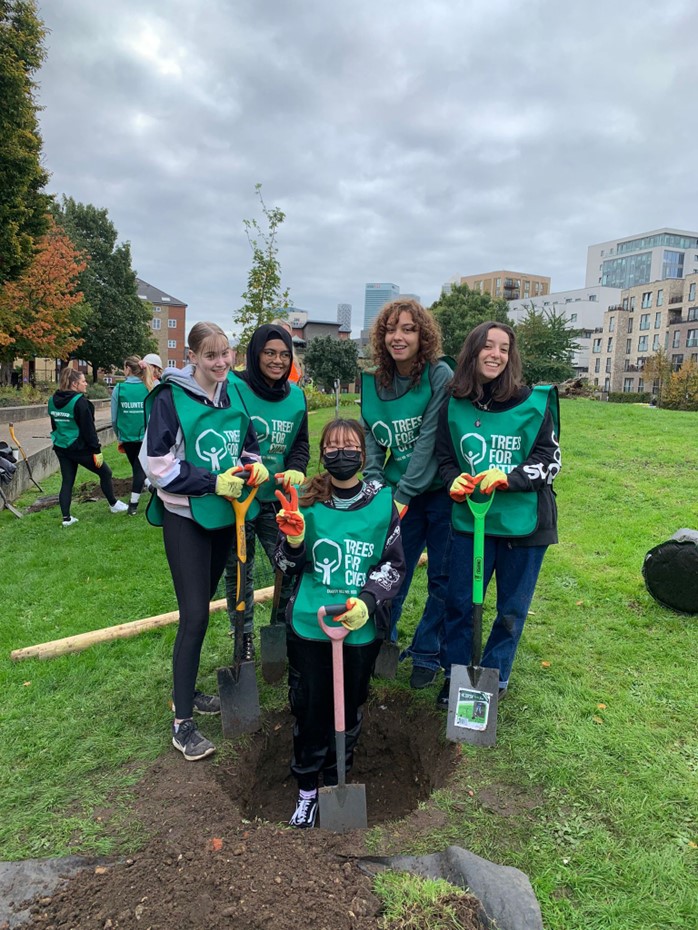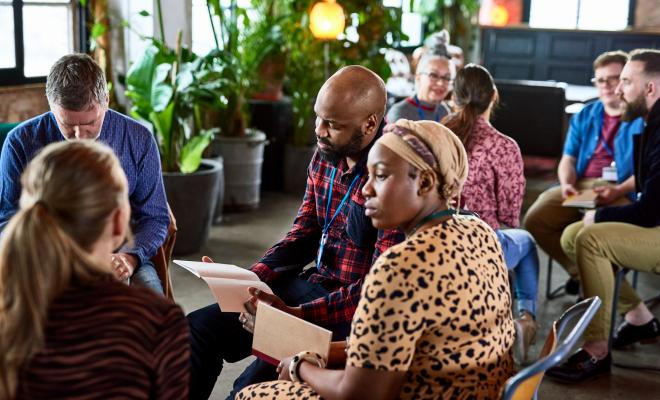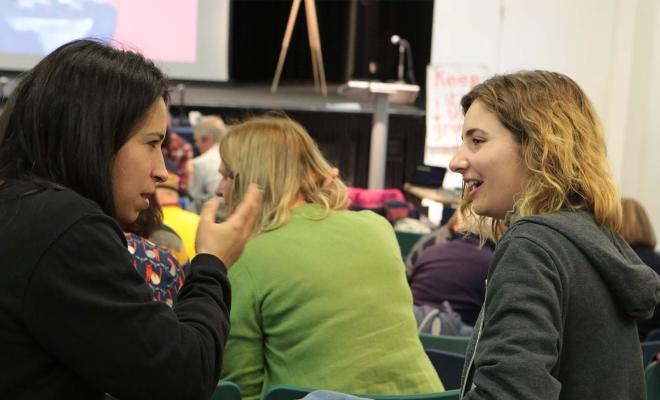03 Dec 2025
Young people aren’t just the ones who’ll inherit the worst impacts of the climate and nature crises. They’re also some of our most inspiring activists. We’re committed to working with young people and prioritising their participation and leadership in the environmental movement.
Whether you already have young activists in your group, would like to increase your youth membership, or are looking to run joint campaigns with youth groups in your area, there are a whole range of ways for local action groups to campaign with young people.
What’s Young Friends of the Earth?
Young Friends of the Earth is a dynamic network of people aged 16 to 25 campaigning for environmental justice. The network focuses heavily on inclusion and is led by young people from historically marginalised backgrounds. Around half of members are alumni of our flagship youth programmes, My World My Home and Climate. Youth. Society, or are members of Young Friends of the Earth groups.
Members are invited to participate in training and events and are provided with further opportunities including our Youth Forum and youth-focused activities within the wider movement.
Membership is open to anyone aged 16 to 25. So, if you have young people in your local action group, please do encourage them to join our youth network if they haven’t already. Young people aged 15 can join the youth network mailing list to keep up to date, but they can't take part until they're 16.
Young Friends of the Earth groups
Our youth network’s newest initiative is for young people to start their own community campaigning groups, like our local action groups. These groups welcome anyone, regardless of their experience and/or knowledge of environmental justice, and especially those from marginalised backgrounds currently underrepresented in the movement. Young people develop and lead their groups, with resources, training and advice provided by Friends of the Earth’s Youth and Families team.
If you’re a young person interested in starting your own youth group, please contact [email protected]
Young people in local action groups
Young people in your area might already be members of your local action group, or they may wish to join. Any young person can join your group, regardless of whether or not they’re involved in our youth network.
However, our safeguarding guidance on how to welcome young people differs depending on their age:
Under 16
They can attend local action group meetings with a parent/guardian present.
16 to 17 years old
They can join the group without a parent/guardian present, but parent/guardian consent is required.
18 to 25 years old
They can join as adults, but please do suggest they sign up to our youth network if they wish to.
For more information about our youth network, or our My World My Home and Climate. Youth. Society programmes, please contact [email protected]
How to welcome young people into local action groups
There are plenty of ways to welcome young people into your group. Here we provide some top tips, as well as guidance on accessibility, collaboration and safeguarding.
Top tips for welcoming young people into your group
- Get to know your new member. As with any potential new member, it’s great to have a one-to-one chat with the young person to introduce your group and find out why they want to join. Each person will have their own reasons and motivations, and this can help inform how they get involved in the group…
- Find out what skills they’d like to use or develop. Some people might have specific skills they can bring to the group, or things they’d like to learn along the way. Others might not mind what they do too much so long as it’s related to an issue they care about. Build a good picture of the person as an individual, and avoid making any assumptions about their interests or skills because of their age.
- Balance support and freedom. Aim to get an understanding of how they might like to get involved. Local action groups should try to find the sweet spot for new group members, one in which they have enough autonomy to pursue their personal interests and passions, but also enough support so that they don’t feel overwhelmed. That sweet spot will be different for everyone.
- Consider the social side. Are they currently the only young person in the group? How would they feel about this? Would they like to bring a couple friends along? Is there someone in the group who can work with them to bring other young people in?
- Consider setting up a sister group specifically for young people. It may work better to set up a youth group to run in parallel to your own, for example if there are several young people involved already or if you can see enthusiasm for different projects from younger members. See our case study below on Alton Climate Action Network.
- Use ground rules and safer spaces. Having young people join is a great time to revisit your group’s ground rules. Are there any you need to remind members of? Is there anything you see as more important now that young people are present? Likewise, ensure your group is safer for people of all ages by using a safer spaces policy.
- Consider group dynamics. In any group setting there are always people who feel more or less confident in speaking up, and people who tend to be listened to or prioritised over others. Are there ways you can ensure that younger group members have an equal voice? Look out for dominant voices and manage these carefully. If people have already spoken, invite contributions from those who haven’t yet. Take a look at our resource on how to hold great meetings for some more ideas.
Advice on making your group accessible
Alice from Climate Action Nottingham has shared her tips for making your group accessible to young people:
- Consider the times of your meetings and campaigning activities. These may be difficult for people who are in education or shift-style work.
- Consider that younger people may have a different experience of politics to you, for example they may be more inclined to share criticisms of all elected officials.
- Don’t assume prior knowledge in your discussions or campaigns.
- Consider whether there are any skills a young person might have that you haven’t thought about previously.
Collaborating with youth groups in your area
Sometimes young people want to organise by themselves, for themselves. While some young people may be looking for an existing group to join, others may prefer to strike out on their own and form a new Young Friends of the Earth group or other youth campaign group.
A new youth group in your area is good news for local environmental campaigning! Find out from the organisers how you can stay up to date with each other's activities, and explore opportunities to collaborate or support each other's campaign actions.
Alice, Climate Action Nottingham
Safeguarding young people
Safeguarding is very important, especially when working with young people. Safeguarding young people from abuse is everyone’s responsibility. We have lots of support available to help groups in the safeguarding of young people and at-risk adults. Please see our safeguarding guidance for more information, including how to report a safeguarding concern.
If your group plans to work directly and/or extensively with young people, your group’s Safeguarding Lead should get in touch with us at [email protected]
Case study: Alton Climate Action Network
Alton Climate Action Network (ACAN) is a local action group based in Hampshire. In 2021 it worked with young people in the area who came together and formed their own youth wing, Young ACAN. Young ACAN welcomes people aged 10 to 24 who want to take action on the climate crisis.
Below we speak with ACAN about the creation of Young ACAN and how the 2 groups collaborate…
How did Young ACAN come about?
Young ACAN was born out of our first Eco Fair in 2021. Several schools provided artwork and speakers, and some of these were keen to start a young people’s campaigning group. Young ACAN reaches out through schools and Alton’s sixth-form college, and has a network of ambassadors who meet regularly.
How do ACAN and Young ACAN work together now?
Young ACAN is largely separate from ACAN. We keep safeguarding in mind at all times, so we have a small group of adults who work regularly with the group and occasionally bring in other people to help with events and run workshops etc.
Our member Emma Jones, without whom none of this would have happened, is a part-time primary and forest school teacher. She ensures parental consent is received for all activities and sends out regular updates to the schools, to be included in their newsletters to parents.
Do you have any advice for other groups working to form a young campaigning group in their area?
- Look for someone with inside knowledge. We struggled to engage with schools until Emma got involved. Being part-time meant she had time to develop Young ACAN, and being a teacher meant she had a way in to local schools. She was invited to address a local head teachers’ meeting recently where she was able to lay out our plans for Young ACAN and ask all the heads to sign their schools up to be “Partner Schools”.
- There are 2 main problems to deal with. One is finding the right contact in each school, someone who’s not only committed but also has enough spare time to do the organising we can’t do from outside.
- The other big problem is that young people grow up and move on. They’re also likely to be busy with other activities and of course exams. At first we limited membership to 2 ambassadors per school, but attendance at meetings dropped off once we’d completed the events they were involved in. We’re now having a recruitment drive and no longer intend to limit numbers attending from each school. We’ve asked the teacher contacts in each partner school to get the word out about our taster session, which will largely be led by existing Young ACAN members.
- We’ve encouraged Young ACAN members to reach out beyond our area to find out what other youth groups are doing. Some of them have signed up to the Youth Eco Forum, which meets fortnightly on Zoom to network and support each other.
What do Young ACAN members have to say about the experience?
Lillie Ewins, Young ACAN co-founder
Erdogan Ornek, Young ACAN member
Isobel Goldie, Young ACAN co-founder





